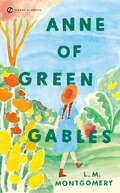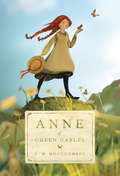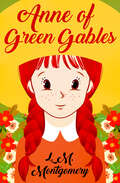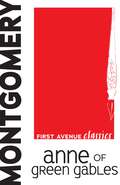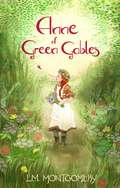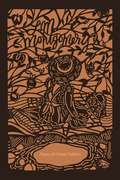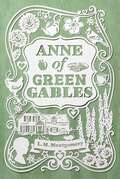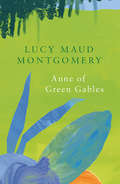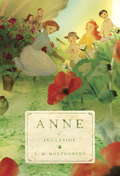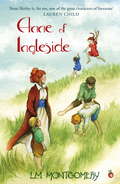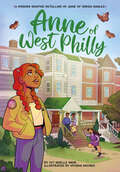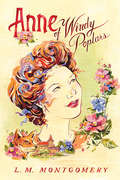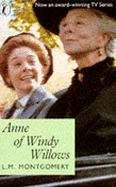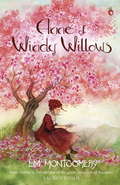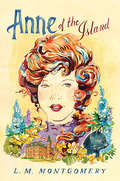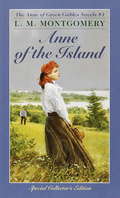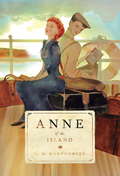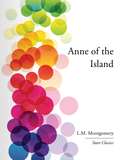- Table View
- List View
Anne of Green Gables: Anne Of Green Gables, Anne Of Avonlea, Anne Of The Island, Anne Of Windy Poplars, Anne's House Of Dreams, Anne Of Ingleside, Rainbow Valley, Rilla Of Ingleside
by L. M. MontgomeryFall in love with spirited, redheaded orphan Anne Shirley as she wins the hearts of everyone in the small town of Avonlea in this beloved children&’s classic.For generations, readers have been charmed by the special world of Green Gables, an old-fashioned farm outside a town called Avonlea. Eleven-year-old Anne Shirley has arrived in this verdant corner of Prince Edward Island only to discover that the Cuthberts—elderly Matthew and his stern sister, Marilla—want to adopt a boy, not a feisty redheaded girl. But before they can send her back, Anne—who simply must have more scope for her imagination and a real home—wins them over completely.Anne of Green Gables—the inspiration for the Netflix series Anne with an E—is a much loved classic that explores all the vulnerability, expectations, and dreams of a child growing up. It is a wonderful portrait of a time, a place, a family...and most of all, love.Includes an Afterword by Jennifer Lee Carrell
Anne of Green Gables: Anne Of Green Gables, Anne Of Avonlea, Anne Of The Island, Anne Of Windy Poplars, Anne's House Of Dreams, Anne Of Ingleside, Rainbow Valley, Rilla Of Ingleside (Anne of Green Gables #1)
by L. M. MontgomeryAnne Shirley is, Mark Twain observed, “the dearest and most lovable child in fiction since the immortal Alice,” and like the elderly Cuthberts who had hoped to adopt a boy instead of the spunky red-headed orphan, generations of readers have grown to love the impetuous Anne.Canada’s best known and most beloved novel is available in the definitive text of Montgomery’s 1908 classic, an enchanting and timeless story of real lives and real loves.
Anne of Green Gables: Anne Shirley Series #1 (Anne of Green Gables #1)
by L. M. MontgomeryOne of literature&’s most irresistible young heroines—the novel that inspired the Netflix series Anne! Sent to Green Gables farm by mistake, eleven-year-old orphan Anne Shirley prays that Matthew and Marilla Cuthbert will decide to keep her nevertheless. The middle-aged brother and sister wanted a boy to help around the farm; a skinny girl with bright red hair and a fiery personality to match is not at all what they need. But Anne&’s quick wit and boundless imagination, developed over a lifetime spent in and out of orphanages, soon charm the Cuthberts and their Prince Edward Island friends and neighbors. The story of a special young girl finally finding her home, Anne of Green Gables is a masterpiece of children&’s fiction and a true delight for readers of all ages. This ebook has been professionally proofread to ensure accuracy and readability on all devices.
Anne of Green Gables: Anne Shirley Series #1 (First Avenue Classics ™)
by Lucy Maud MontgomeryWhen brother and sister Matthew and Marilla Cuthbert decide to adopt an orphan child to help them on the Green Gables farm, Anne Shirley is not the kind of child they have in mind. Matthew arrives at the train station expecting to meet a boy, but the orphanage sends eleven-year-old Anne by mistake. Free-spirited Anne presents a challenge to Marilla, who tries to impart the importance of manners and proper ladylike behavior to her. But Anne soon becomes an essential and beneficial part of the Cuthbert's lives. This unabridged version of Canadian author Lucy Maude Montgomery's coming-of-age story was first published in 1908.
Anne of Green Gables: Anne's Age: 11-16) (Anne of Green Gables #1)
by L. M. Montgomery'Oh, it seems so wonderful that I'm going to live with you and belong to you. I've never belonged to anybody'When a scrawny, freckled girl with bright red hair arrives on Prince Edward Island, Marilla and Matthew Cuthbert are taken by surprise; they'd asked for a quiet boy to help with the farm work at Green Gables. But how can you return a friendless child to a grim orphanage when she tells you her life so far has been a 'perfect graveyard of buried hopes'? And so, the beguiling chatterbox stays. Full of dreams, warmth and spirit, it is not long before Anne Shirley wins their hearts.This collection of the best children's literature, curated by Virago, will be coveted by children and adults alike. These are timeless tales with beautiful covers, that will be treasured and shared across the generations. Some titles you will already know; some will be new to you, but there are stories for everyone to love, whatever your age. Our list includes Nina Bawden (Carrie's War, The Peppermint Pig), Rumer Godden (The Dark Horse, An Episode of Sparrows), Joan Aiken (The Serial Garden, The Gift Giving) E. Nesbit (The Psammead Trilogy, The Bastable Trilogy, The Railway Children), Frances Hodgson Burnett (The Little Princess,The Secret Garden) and Susan Coolidge (The What Katy Did Trilogy). Discover Virago Children's Classics.
Anne of Green Gables: Seasons Edition -- Fall (Anne's Age: 11-16) (Seasons Edition)
by L. M. MontgomeryAnne of Green Gables, by L.M. Montgomery, one of literature&’s most beloved stories, is now available in a fine exclusive collector&’s edition featuring a laser-cut jacket on a textured book with foil stamping, making it ideal for fiction lovers and book collectors alike. Each collectible volume will be the perfect addition to any well-appointed library.The Anne of Green Gables Seasons Edition--Fall:Presents L.M. Montgomery&’s beloved novel, widely viewed as a shining example of the quintessential children&’s novel, though readers of all ages have fallen in love with Anne, the Cuthbert siblings, and all of their friendsExplores such important themes as imagination vs. reality, the pressures of social expectations, and the differences between true emotion and mere sentimentalityIs ideal for special-edition book collectors, fans of literary fiction and classic literature, and people who love both the book and the cinematic adaptations it inspiredWhether you&’re buying this as a gift or as a self-purchase, this remarkable limited edition features:Beautiful hardcover with a distinctive one-of-a-kind, high-end/high-treatment laser-cut jacket, perfect for standing out on any discerning fiction-lover&’s bookshelfTrim Size: 6 x 9Beautiful decorative interior pages featuring pull quotes distributed throughoutAn exquisite matching laser-cut bookmarkPart of a 4-volume Fall Seasons series including Sense and Sensibility, Dracula, and Shakespeare in Autumn: Select Plays and the Complete Sonnets. When 11-year-old orphan Anne Shirley is mistakenly sent to live with siblings Matthew and Marilla Cuthbert on their farm, she finds herself in a real home for the first time in her life. But fiery, spirited Anne certainly isn&’t the sturdy boy they had planned to adopt. Despite her mischief and affinity for finding trouble, the longer Anne stays at Green Gables, the harder it is for the Cuthberts to imagine life without her.Anne of Green Gables by L.M. Montgomery (Seasons Edition--Fall) is one of four titles available in this collection. The Fall season set also will include Sense and Sensibility, Dracula, and Shakespeare in Autumn: Select Plays and the Complete Sonnets.
Anne of Green Gables: The Complete Collection (Aladdin Classics)
by L. M. Montgomery Katherine PatersonWhen Anne Shirley arrives at Green Gables farm on Prince Edward Island, she surprises everyone: first of all, she is a girl. Marilla Cuthbert and her brother, Matthew, had specifically asked for an orphan boy. She has bright red hair that won't manage and a mouth that won't shut. Nothing will ever be the same at Green Gables!A favorite story of generations of girls ever since it was first published in 1908, Lucy Maud Montgomery's classic story of one girl's profound effect on a small Canadian community has stayed in print for nearly one hundred years and has been made into a popular TV series and even a musical.
Anne of Green Gables: The Complete Collection (Legend Classics #1)
by L. M. MontgomeryAs it gets harder for the older siblings Miss Marilla Cuthbert and Mr. Matthew Cuthbert to take care of their farm on Prince Edward Island, they decide to adopt a young boy to help them out. Meanwhile a misunderstanding occurs and instead of sending a boy, the orphanage sends them the 11-year-old spunky Anne Shirley instead. Initially Marilla and Matthew plan to send Anne back to the orphanage, but they soon realize that they need her as much as she needs them.
Anne of Hollywood
by Carol Wolper"I wasn't prepared for the enemies. Had I been as gorgeous as a supermodel, or as rich as an heiress, or an actress with an Oscar to my credit, people would still not be happy that I had Henry's attention, but they'd understand. What they resented was the king coupling with a 'nobody.'" Skirts may be shorter now, and messages sent by iPhone, but passion, intrigue, and a lust for power don't change. National bestselling author Carol Wolper spins a mesmerizing tale of a twenty-first-century Anne Boleyn. Wily, intelligent, and seductive, with a dark beauty that stands out among the curvy California beach blondes, Anne attracts the attention of Henry Tudor, the handsome corporate mogul who reigns in Hollywood. Every starlet, socialite, and shark wants a piece of Henry, but he only wants Anne. The question is: can she keep him? Welcome to a privileged world where hidden motives abound, everyone has something to sell, and safe havens don't exist. With her older sister Mary, a pathetic example of a royal has-been, Anne schemes to win her beloved Henry in the only way that gives a promise of forever--marriage. Success will mean contending with backstabbing "friends," Henry's furious ex-wife, and the machinations of her own ambitious family, and staying married to a man who has more options than most and less guilt than is good for either of them will take all her skill. Anne will do anything to hold on to the man--and the lifestyle--she adores, however, even if sticking your neck out in Hollywood means risking far worse than a broken heart. With Henry's closest confidante scheming against her, and another beautiful contender waiting in the wings, Anne is fighting for her life. Can she muster the charm and wit to pull off her very own Hollywood ending?
Anne of Hollywood
by Carol WolperSkirts may be shorter now, and messages sent by iPhone, but passion, intrigue, and a lust for power don't change. National bestselling author Carol Wolper spins a mesmerizing tale of a twenty-first-century Anne Boleyn.??Skirts are shorter now, and messages sent by iPhone, but passion, intrigue, and a lust for power don't change. National bestselling author Carol Wolper spins a mesmerizing tale of a twenty-first-century Anne Boleyn. Wily, intelligent, and seductive, with a dark beauty that stands out among the curvy California beach blondes, Anne attracts the attention of Henry Tudor, the handsome corporate mogul who reigns in Hollywood. Every starlet, socialite, and shark wants a piece of Henry, but he only wants Anne. The question is: can she keep him? Welcome to a privileged world where hidden motives abound, everyone has something to sell, and safe havens don't exist. Henry Tudor has more options than most men, and less guilt than is good for anyone. The two may be in love, but even Anne's wiles and skill won't guarantee his enduring passion. With Henry's closest confidante scheming against her, and another beautiful contender waiting in the wings, Anne is fighting not just for the lifestyle to which she has grown accustomed . . . but for love. Can she muster the charm and wit to pull off her very own Hollywood ending?
Anne of Ingleside
by L. M. MontgomeryThere's never a dull moment for busy, bustling Anne, who's now the mother of five children and has a sixth one on the way. With her visiting aunt, the insufferable Mary Maria, also in the mix--and soon wearing out her welcome--Anne's life is a constant whirl. But despite the endless demands on her time, Anne can't think of any place she'd rather be than her beloved Ingleside. At least not until the day she begins to imagine that her cherished Gilbert doesn't love her anymore. Could it possibly be true? She's a little older, maybe, but in her heart she knows she's still the same fiery redhead who came to Green Gables all those years ago. She hasn't changed, but has he? Never one to go down without a fight, the irrepressible, indomitable Anne sets out to make her husband fall in love with her all over again.
Anne of Ingleside (Anne Shirley #6)
by L. M. MontgomeryAnne is the mother of five, with never a dull moment in her lively home. And now with a new baby on the way and insufferable Aunt Mary Maria visiting -- and wearing out her welcome -- Anne's life is full to bursting. Still Mrs. Doctor can't think of any place she'd rather be than her own beloved Ingleside. Until the day she begins to worry that her adored Gilbert doesn't love her anymore. How could that be? She may be a little older, but she's still the same irrepressible, irreplaceable redhead -- the wonderful Anne of Green Gables, all grown up. . . She's ready to make her cherished husband fall in love with her all over again!
Anne of Ingleside: Anne Of Green Gables, Anne Of Avonlea, Anne Of The Island, Anne Of Windy Poplars, Anne's House Of Dreams, Anne Of Ingleside, Rainbow Valley, Rilla Of Ingleside (Anne of Green Gables #6)
by L. M. MontgomeryThe sixth book in the Anne Shirley series.'It's been lovely to be Anne of Green Gables again for a week, but it's a hundred times lovelier to come back and be Anne of Ingleside'There's never a dull moment at Ingleside, Anne's lively home: Anne is now the mother of five children - with a sixth baby on the way. But even with endless demands on her time, she couldn't be happier and there's nowhere in the world she'd rather be. No matter what life brings - whether it's the numerous scrapes her children get up to or Gilbert's insufferable aunt outstaying her welcome by months - Anne faces every challenge with her usual verve for life. But then she begins to suspect that Gilbert doesn't love her any more. She's a little older, it's true, but Anne is the same spirited redhead she's always been. She hasn't changed. But has he?A collection that will be coveted by children and adults alike, this list is the best in children's literature, curated by Virago. These are timeless tales with beautiful covers, that will be treasured and shared across the generations. Some titles you will already know; some will be new to you, but there are stories for everyone to love, whatever your age. Our list includes Nina Bawden (Carrie's War, The Peppermint Pig), Rumer Godden (The Dark Horse, An Episode of Sparrows), Joan Aiken (The Serial Garden, The Gift Giving) E. Nesbit (The Psammead Trilogy, The Bastable Trilogy, The Railway Children), Frances Hodgson Burnett (The Little Princess,The Secret Garden) and Susan Coolidge (The What Katy Did Trilogy). Discover Virago Children's Classics.
Anne of Manhattan: A Novel
by Brina StarlerL. M. Montgomery’s classic tale, Anne of Green Gables, gets a romantic, charming, and hilarious modern adaptation, set in New York City.After an idyllic girlhood in Avonlea, Long Island, Anne has packed up her trunk, said goodbye to her foster parents, Marilla and Matthew, and moved to the isle of Manhattan for grad school. Together with her best friend, Diana Barry, she’s ready to take on the world and find her voice as a writer.When her long-time archrival Gilbert Blythe shows up at Redmond College for their final year, Anne gets the shock of her life. Gil has been in California for the last five years—since he kissed her during a beach bonfire, and she ghosted him. Now the handsome brunette is flashing his dimples at her like he hasn’t a care in the world and she isn’t buying it.Paired with the same professor for their thesis, the two former competitors come to a grudging peace that turns into something so much deeper…and sexier than either intended. But when Gil seemingly betrays her to get ahead, Anne realizes she was right all along—she should never have trusted Gilbert Blythe.While Gil must prove to Anne that they’re meant to be together, she must come to terms with her old fears if she wants a happily-ever-after with the boy she’s always (secretly) loved.
Anne of West Philly: A Modern Graphic Retelling of Anne of Green Gables (Classic Graphic Remix)
by Ivy Noelle WeirAnne of Green Gables with a twist: in this follow-up to Meg, Jo, Beth, and Amy and The Secret Garden on 81st Street, this full-color graphic novel moves Anne Shirley to modern-day West Philadelphia, where where she finds new friends, new rivals, and a new family.When Marilla and Matthew Cuthbert decide to foster a teenage girl for the first time, their lives are changed forever. Their redheaded foster daughter, Anne Shirley, is in search of an exciting life and has decided that West Philly is where she's going to find it. Armed with a big personality and unstoppable creativity, Anne takes her new home by storm as she joins the robotics club, makes new friends in Diana and Gilbert, experiences first love, and turns the ordinary into the extraordinary. But as Anne starts to get comfortable, she discovers one thing she wasn't looking for: a family.This title will be simultaneously available in hardcover.
Anne of Windy Poplars (Anne Shirley #4)
by L. M. MontgomeryAnne Shirley has left Redmond College behind to begin a new job and a new chapter of her life away from Green Gables. Now she faces a new challenge: the Pringles. They're known as the royal family of Summerside - and they quickly let Anne know she is not the person they had wanted as principal of Summerside High School. But as she settles into the cozy tower room at Windy Poplars, Anne finds she has great allies in the widows Aunt Kate and Aunt Chatty - and in their irrepressible housekeeper, Rebecca Dew. As Anne learns Summerside's strangest secrets, winning the support of the prickly Pringles becomes only the first of her triumphs.
Anne of Windy Poplars: Large Print (Anne Of Green Gables: The Complete Collection)
by L. M. MontgomeryAnne Shirley has left Redmond College behind to begin a new job and a new chapter of her life away from Green Gables. Now she faces a new challenge: the Pringles. They're known as the royal family of Summerside - and they quickly let Anne know she is not the person they had wanted as principal of Summerside High School. But as she settles into the cozy tower room at Windy Poplars, Anne finds she has great allies in the widows Aunt Kate and Aunt Chatty – and in their irrepressible housekeeper, Rebecca Dew. As Anne learns Summerside's strangest secrets, winning the support of the prickly Pringles becomes only the first of her delicious triumphs.
Anne of Windy Willows
by L. M. MontgomeryThere are just two kinds of people in Summerside: those who are Pringles and those who aren't. Anne Shirley, the red-haired girl from Green Gables, has now grown into a young woman and her romance with Gilbert Blythe begins to flourish. There are important developments in her career too, for Anne is now Principal of Summerside High School. But life is not easy at the school, and it needs all Anne's courage, diplomacy and natural high spirits to overcome the prejudice of the locals and, more particularly, the Pringles the family that virtually rules the town and the surrounding countryside.
Anne of Windy Willows (Anne of Green Gables #4)
by L. M. MontgomeryThe fourth book in the Anne Shirley series.'Gilbert, I'm afraid I'm scandalously in love with you'Anne Shirley and Gilbert Blythe are at last engaged, but still they are apart: for three years Gilbert will be away at medical school, while Anne has a new job as principal of Summerside High School. Absence couldn't make their hearts any fonder, though, and they share all their love and news in letters.At Summerside, Anne settles in happily, lodging at Windy Willows, home of two widows - Aunt Kate and Aunt Chatty - and their irrepressible housekeeper, Rebecca Dew. With firm friends like these beside her, she can face anyone - even the Pringles, the 'Royal Family' of Summerside, who waste no time in snubbing Anne and letting her know that she wasn't their choice for principal. Can Anne ever hope to win them over?This collection of the best in children's literature, curated by Virago, will be coveted by children and adults alike. These are timeless tales with beautiful covers, that will be treasured and shared across the generations. Some titles you will already know; some will be new to you, but there are stories for everyone to love, whatever your age. Our list includes Nina Bawden (Carrie's War, The Peppermint Pig), Rumer Godden (The Dark Horse, An Episode of Sparrows), Joan Aiken (The Serial Garden, The Gift Giving) E. Nesbit (The Psammead Trilogy, The Bastable Trilogy, The Railway Children), Frances Hodgson Burnett (The Little Princess,The Secret Garden) and Susan Coolidge (The What Katy Did Trilogy). Discover Virago Children's Classics.
Anne of the Fens (The Bradstreet Chronicles #1)
by Gretchen GibbsShould Anne risk arrest and scandal to help a fugitive escape? Her decision will change her life.In 1628, with England torn by conflict, fifteen-year old Anne Dudley helps a rebel escape from Tattershall Castle through the watery fens. Pursued by the sheriff and his men, who view her Puritan family as traitors to the king, Anne risks more than the loss of her reputation as the daughter of the earl's steward - she also risks death. Set in a period when women and men were burned or hanged for their religion, the novel tells the story of a girl who must cope with a woman's feelings while she struggles with romantic turmoil, political danger, and doubts about her own beliefs. When she takes up her pen, we glimpse the grown Anne Dudley Bradstreet, whose Colonial writings are still loved and honored today.From a talented new voice in historical fiction, Gretchen Gibbs' Anne of the Fens joins The Book of Maggie Bradstreet in The Bradstreet Chronicles. Records about the author's well-known ancestors give birth to her stories. Read the series--enriched by the historical content in each book's back pages--in any order.
Anne of the Island
by L. M. MontgomeryNew adventures lie ahead as Anne Shirley packs her bags, waves good-bye to childhood, and heads for Redmond College. With old friend Prissy Grant waiting in the bustling city of Kingsport and frivolous new pal Philippa Gordon at her side, Anne tucks her memories of rural Avonlea away and discovers life on her own terms, filled with surprises...including a marriage proposal from the worst fellow imaginable, the sale of her very first story, and a tragedy that teaches her a painful lesson. But tears turn to laughter when Anne and her friends move into an old cottage and an ornery black cat steals her heart. Little does Anne know that handsome Gilbert Blythe wants to win her heart, too. Suddenly Anne must decide if she's ready for love...From the Paperback edition.
Anne of the Island
by L. M. MontgomeryNew adventures lie ahead as Anne Shirley packs her bags, waves good-bye to childhood, and heads for Redmond College. With old friend Prissy Grant waiting in the bustling city of Kingsport and frivolous new pal Philippa Gordon at her side, Anne tucks her memories of rural Avonlea away and discovers life on her own terms, filled with surprises...including a marriage proposal from the worst fellow imaginable, the sale of her very first story, and a tragedy that teaches her a painful lesson. But tears turn to laughter when Anne and her friends move into an old cottage and an ornery black cat steals her heart. Little does Anne know that handsome Gilbert Blythe wants to win her heart, too. Suddenly Anne must decide if she's ready for love...From the Paperback edition.
Anne of the Island
by L. M. MontgomeryEighteen-year-old Anne has left Green Gables for university in nearby Nova Scotia, where she will finally fulfill her dream of earning a degree. She sets up home in a cozy cottage in bustling Kingsport with Avonlea's Priscilla Grant and a new friend, the beautiful Philippa Gordon. But it's not all fun and games. Anne's childhood friend, Ruby Gillis, dies of tuberculosis back in Avonlea, shattering Anne's carefree attitude to life, and Gilbert finally declares his feelings and proposes. But Anne still has a naïve, overly romantic view of love and rejects him, driving a wedge between them. A two-year relationship with a fellow Redmond College student, Roy Gardner, follows, but when he also proposes, Anne realizes that he's not the one for her after all. When she returns to Avonlea and learns that Gilbert is deathly ill with typhoid, she is distraught. Will she recognize the depth of her feelings at last? Or is it already too late for Anne and her one true love?
Anne of the Island
by L. M. MontgomeryThis is the continuing story of Anne Shirley and the third book in the Anne of Green Gables series. In it Anne attends Redmond College where she is studying for her BA. She has many trials and tribulations along the way, including some romance. In Anne of the Island the reader is also introduced to many new characters, that in the true sense of Anne are also "kindred spirits".
